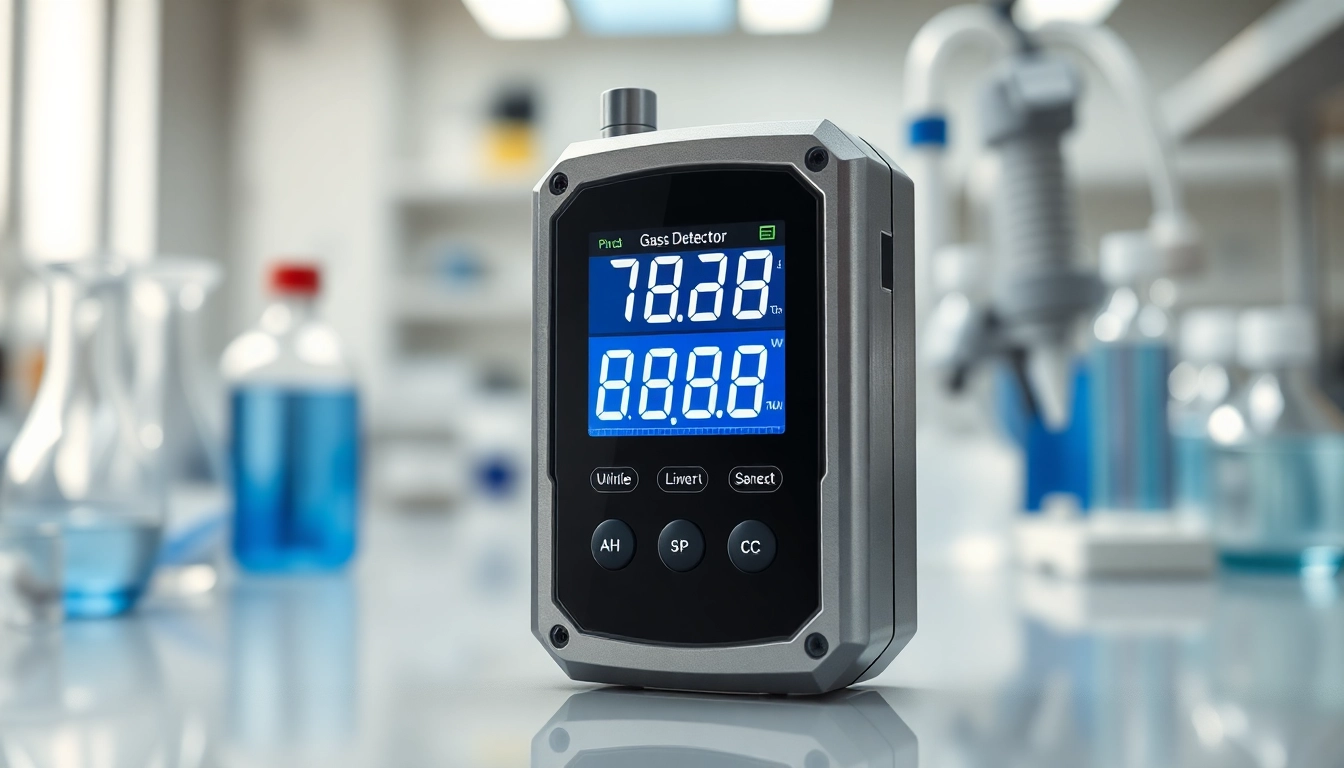Understanding Hydrogen Gas Detectors
What is a Hydrogen Gas Detector?
A hydrogen gas detector is a vital safety instrument designed to sense the presence of hydrogen in an environment. As a highly flammable and odorless gas, hydrogen poses significant safety risks in various industrial and laboratory settings. These detectors play a crucial role in preventing hazardous situations by alerting personnel to the presence of hydrogen before it reaches dangerous concentrations. The implementation of hydrogen gas detectors is essential for ensuring workplace safety and compliance with regulatory standards.
How Hydrogen Gas Detectors Work
Hydrogen gas detectors utilize various technologies to identify hydrogen molecules in the air. Common detection methods include:
- Catalytic sensors: These sensors detect hydrogen by measuring changes in temperature that occur when hydrogen oxidizes at the surface of the sensor.
- Electrochemical sensors: These devices use chemical reactions to produce a measurable electrical current when hydrogen is present, which is proportional to its concentration.
- Infrared sensors: Infrared detectors identify hydrogen based on its unique absorption characteristics in the infrared spectrum.
- Semiconductor sensors: This technology involves changes in resistance when hydrogen interacts with the semiconductor material.
The choice of sensor technology depends on the specific application, environmental conditions, and sensitivity requirements.
Importance of Accurate Detection
Accurate detection of hydrogen gas is indispensable for several reasons:
- Safety: Early detection allows for timely action, reducing the risk of explosions or fires associated with hydrogen leaks.
- Regulatory compliance: Many industries are governed by strict guidelines regarding gas detection to ensure the safety of workers and the environment.
- Operational efficiency: Reliable detection systems can help prevent costly downtime and incidents that may disrupt operations.
Key Features to Look for in a Hydrogen Gas Detector
Sensor Types and Sensitivity
When selecting a hydrogen gas detector, the type of sensor and its sensitivity are crucial factors to consider. Detectors should be capable of identifying low concentrations of hydrogen while minimizing false alarms. For environments with potential interference from other gases, multi-gas detectors that can accurately monitor several gases simultaneously might be necessary.
Calibration and Maintenance Features
Regular calibration is essential to ensure accurate readings from hydrogen gas detectors. Choose detectors with user-friendly calibration processes, preferably those that provide automatic calibration features. Additionally, robust maintenance protocols should be outlined, including regular testing, sensor replacement, and software updates to ensure the detectors operate optimally.
Portability and User-Friendliness
For situations where mobility is essential, portable hydrogen gas detectors are a practical choice. These devices should be lightweight and easy to use, with intuitive displays and straightforward operation. Features such as audible alarms and visual alerts enhance usability, making it easier for personnel to respond quickly during emergencies.
Applications of Hydrogen Gas Detectors
Industrial Applications
In industrial settings, hydrogen is commonly used as a fuel and in chemical processing. Industries such as oil and gas, petrochemicals, and metals manufacturing require vigilant monitoring of hydrogen levels. Hydrogen gas detectors are integrated into facilities to maintain safety standards and operational integrity.
Laboratory Safety
In research environments, hydrogen is used in various experiments and processes, often making it vital to have detectors in place. Labs must be equipped with reliable hydrogen gas detectors to prevent unsafe accumulation and ensure that staff can work efficiently and safely.
Emergency Response Scenarios
Hydrogen gas detectors are also essential tools for emergency responders. In the event of a hydrogen leak, these devices allow emergency personnel to assess the situation accurately and deploy appropriate measures for containment and evacuation, safeguarding both responders and the public.
Benefits of Using a Hydrogen Gas Detector
Enhancing Safety Measures
The primary benefit of hydrogen gas detectors is safety enhancement. By providing real-time monitoring and alerts, these devices significantly reduce the risk of accidents associated with hydrogen. Through proactive detection, businesses can implement timely safety measures to mitigate potential hazards before they escalate.
Compliance with Regulations
Compliance with safety regulations is non-negotiable in many industries. Hydrogen gas detectors help businesses meet legal safety standards, avoiding fines and potential liabilities. Regular inspections and updated compliance reports related to gas detection ensure organizations are prepared for audits and evaluations.
Cost Efficiency in the Long Run
Investing in quality hydrogen gas detectors leads to long-term savings. By reducing the potential for accidents, companies can avoid the financial ramifications associated with workplace incidents, including medical expenses and operational disruptions. Furthermore, efficient gas detection systems minimize downtime, enhancing overall productivity.
Best Practices for Implementing Hydrogen Gas Detection
Installation Guidelines
Proper installation of hydrogen gas detectors is critical for their functionality. Follow these guidelines:
- Determine optimal placement based on the potential sources of hydrogen leaks, such as storage tanks, pipelines, and processing equipment.
- Consider airflow patterns, as airborne hydrogen will rise; therefore, detectors should be installed at appropriate heights.
- Ensure that the detectors are situated away from areas of interference such as vents, fans, or other gas sources that may cause false alarms.
Regular Testing and Maintenance
Routine testing and maintenance of hydrogen gas detectors are necessary to ensure their reliability. Develop a maintenance schedule based on manufacturer recommendations, which may include calibration checks, sensor replacements, and software updates. Keeping a detailed log of maintenance activities will assist in compliance and operational audits.
Training for Effective Use
Providing training for staff on the correct use and responses related to hydrogen gas detectors is crucial. Conduct regular training sessions that cover:
- How to read and interpret detection data.
- Emergency response protocols for dealing with hydrogen leaks.
- Maintenance procedures for ensuring the operational readiness of detectors.
Effective training programs not only enhance safety but also cultivate a culture of awareness and preparedness within the organization.

Leave a Reply